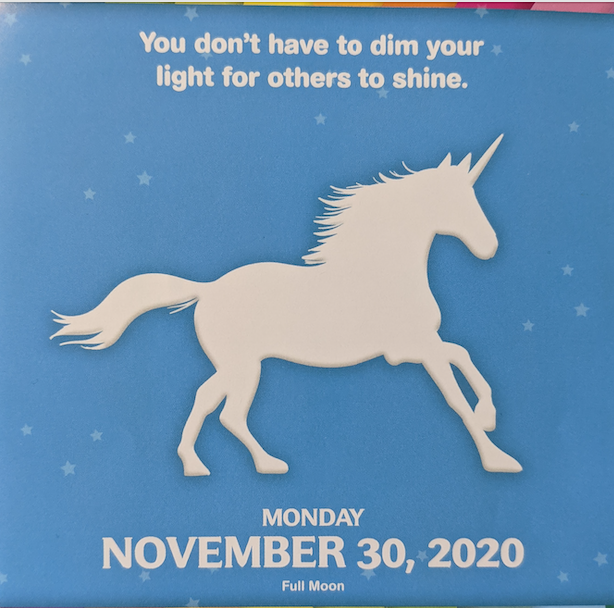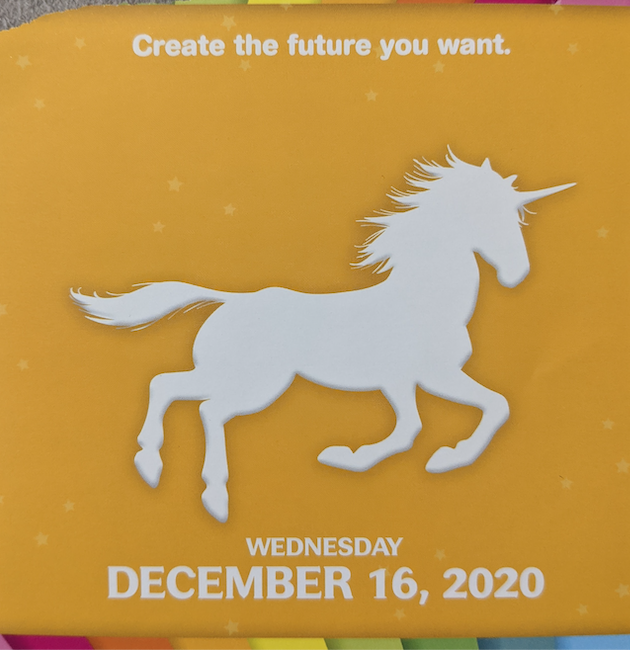I enjoy a good end of year list, and while I’m eager to leave 2020 behind and open the door to 2021, I can’t breeze by the fact that I learned a lot about myself and how to exist as a creative person this year. If you follow me on social media, you’ll notice I post pictures of my Advice from a Unicorn calendar every once in awhile. I love this calendar. It’s uncanny how often the unicorn knows exactly what I need to hear on any given day. I’ve gathered some of my favorite pieces of unicorn advice and compiled them into my top 5 creative learnings of 2020. Enjoy!
1. Practice Self Care
How many times did we hear it in 2020? #selfcare But the thing is, people said it (and meant it) for a reason. You can’t fill someone (or something) else’s cup if there’s nothing in yours to pour from. This applies to taking care of family, friends, to work, to hobbies, to exercise, and yes, to creative endeavors. Most of the year I couldn’t think about creative things. I had no physical or mental energy to spare. So I really had to lean into self care, learning not just how important it is for my health and creative well being, but also learning the type of self care that works best for me. For example, I really, really had to work on giving myself grace. And rest. These are two of the hardest forms of self care for me, but the most important. This wasn’t the year I hoped it would be. I chastised myself for not being as productive as I wanted, but that only made me feel worse. When I gave myself grace for doing the best I could in a difficult year, and allowed myself the time and space to rest, I slowly but surely, found the mental and physical energy I needed for the things I wanted to do.
An important reminder here: self care is not one and done. It’s ongoing. Build it into your lifestyle, your day, your routine, whatever. Just know it’s something you have to keep coming back to in order to sustain and survive as a human on this journey called life.
2. Find, Embrace, and Support Your Community
During one of the webinars I attended this year, the facilitator said something to the effect of, “no one creates a (picture) book on their own anymore.” They were referring to the idea that it takes critique partners and beta readers and illustrators and often agents and editors to shape, mold, edit, revise, and produce a book that goes out into the world. In other words, it takes a community of people to make a book happen.
It also takes a community to live as a creative. These are the people that will motivate and inspire you, and lift and support you, cheer and cry with you. These are the people who know how hard the work is, know how painful the lows are, and can appreciate how just how damn good the wins are.
Author Courtney Maum in her book, Before and After the Book Deal: A Writer’s Guide to Finishing, Publishing, Promoting, and Surviving Your First Book, talks about the importance of literary citizenship. I love this concept. Being part of a community isn’t just about the support you receive, it’s also about the support you provide. Being a literary citizen will look a little different for everyone, based on what’s in alignment with their values, but it’s important to be an involved and supportive citizen, even when we’re feeling low because everyone is getting an agent or book deal but us. :) As the unicorn says, “you don’t have to dim your light for others to shine.”
It’s also critical that we shine light on, and lift up, BIPOC, LGBTQIA+, and disabled creators, communities, and voices. The disparity and inequity that exists in this industry is staggering and not enough progress is being made. As starting points, I highly encourage reading this NYTimes article and this Vox article, as well as these 2019 survey results on diversity in the publishing industry. Request, buy, read, and recommend books by BIPOC, LGBTQIA+, and disabled authors and illustrators, and support organizations like We Need Diverse Books. As a person with privilege, it is my responsibility to advocate for, and assist in, growing and changing the representation and equity so desperately needed in (and outside of) our creative community.
3. Do The Work
It’s really that simple. The story won’t write itself. An agent can’t read the story brewing in your head. The book deal won’t magically appear. We have to do the work to make it happen. But how easy it is to forget that sometimes, especially when we’re busy or in a slump.
Peloton instructor Alex Toussaint said something on a recent ride that really stuck with me. It was something along the lines of, “persistence gets you there, consistence keeps you there.” While the context was mostly around physical activity, I couldn’t help but feel gobsmacked by this insight and how it applies to creative work. We have to be persistent if we want to reach our goals, and we have to stay consistent in developing our craft if we want to continue to create work that can be shared with the world.
Do the work. A little bit day by day. Sometimes that’s all it takes.
4. Don’t Let the Hard Stuff Stop You
Rejections. Disappointments. Obstacles (ourselves included). Doubt. There’s always something hard and seemingly impossible to overcome that will get in our way. It usually forces us to ask, “how bad do I want it?”
Sometimes when I ask myself, “how bad do I want it?” I get real pumped up, like my own hype woman, and I feel ready to burst through a wall. Other times, my energy might be lacking but the conviction is still there, and I quietly promise to do one small thing in the next hour or the next day that will keep me moving forward.
Hard stuff will happen. It’s an inevitable part of the journey. But it’s how we respond to the hard stuff that makes all the difference. Will we let it stop us from achieving our dreams? Or will we respond in a way that keeps us moving forward? If we want it that bad, we have to choose to keep moving forward.
5. Perfection Doesn’t Exist
I recently had a heart to heart with a co-worker and fellow (now agented!!!!) writer. I was explaining that I felt like I needed to have perfection (in my manuscripts) before I could query. She was quick to lovingly remind me that I don’t need perfection. It doesn’t exist. And it’s so true. Even published books have things like typos, and most published authors can point to things in their books that they would change even after the book is published.
Perfection keeps us from creating. We can get so stuck in the fear of something not being perfect, or good enough, that we don’t create at all. And when we don’t create, we’re not doing the work (see #3 above). I know that I’m not yet the writer I want to be, but I want to get there. My craft will develop in time, but it won’t develop at all if I let perfectionism get in the way. Working through perfectionism is as simple (and as hard as) just getting the words on the paper so they have the opportunity to flourish. They can’t flourish if they’re not there.
Bonus!
If you’ve made it this far, I applaud your stamina and commitment. I also leave you with three of my favorite pieces of unicorn advice that capture the energy I’m taking into 2021. I hope they inspire and send you into 2021 with good vibes. Wishing you and yours the best in health and prosperity in the New Year!





























